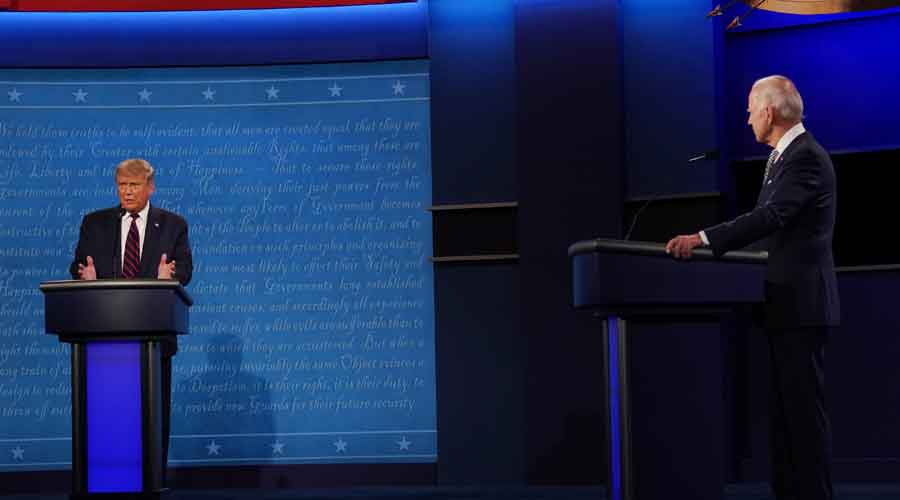The first presidential debate between Donald Trump and Joe Biden, his challenger from the Democratic Party, often descended to such a level that many commentators called it “unwatchable”. Chris Wallace, the moderator, also thought that it was “a terrible missed opportunity”. According to The Washington Post, the candidates interrupted Wallace or each other 90 times in the 90-minute debate, of which 71 interruptions were by Trump. Many viewers were surprised by the brawl-like exchanges. But were they really unanticipated? Four years ago, things had turned ugly during the first debate between Trump and Hillary Clinton in New York.
The first presidential debate, between John F. Kennedy and Richard Nixon, drew over 66 million viewers out of a population of 179 million. An estimated 73.1 million people tuned in to the chaotic Trump-Biden face-off, down from the 84 million who had watched the first debate between Trump and Clinton in 2016. Yet, the Trump-Biden debate ranked as the second-most-watched event this year, behind only the Super Bowl’s roughly 100 million viewers.
In spite of numerous attempts, Wallace, the Fox News anchor, failed to control Trump. One wonders what would have happened if there had been no moderator at all. The seven debates in 1858 between Abraham Lincoln and Senator Stephen A. Douglas — the precursor to today’s presidential debates — were held without a moderator. The candidates took turns to open each debate with a one-hour speech; the rival had one-and-a-half hour for rebuttal and, finally, the first candidate closed the debate with a half-an-hour response. In his 1950 book, Persuasive Speaking, the American author and an authority on public speaking, Robert T. Oliver, wrote: “Persuasion is the civilized substitute for harsh authority and ruthless force.”
Has the culture of debating become uncivilized in this age of post-truth?
The first presidential debate in American history, the one between Kennedy and Nixon in Chicago in 1960, had been moderated by Howard K. Smith. In it, neither of the two candidates had interrupted each other, hurled personal insults or questioned each other’s mental fitness or loyalty to the nation. Even as recently as 2012, the first debate between President Barack Obama and Governor Mitt Romney witnessed few disruptions: Obama interrupted Romney seven times, Romney returned the favour four times. Obama interrupted the moderator, Jim Lehrer, five times, whereas Lehrer was interrupted by Romney 12 times.
However, things changed in 2016. The New York Times says that Trump interrupted Clinton 39 times while she interrupted him eight times in the New York debate. It was widely argued that interruptions were part of Trump’s debate strategy. It seems that his strategy has remained unchanged. Interruptions, a barrage of insults, bullying, and name-calling between two senior politicians were the chief highlights of the much-hyped Trump-Biden Cleveland show. Most people found it utterly tasteless. After the first debate between Trump and Biden dissolved into chaos, the Commission on Presidential Debates felt that “additional structure should be added to the format of the remaining debates to ensure a more orderly discussion of the issues.”
Debate is a way of persuasion. The ancient Greeks called it the ‘science of rhetoric’. Plato was opposed to rhetoric in favour of dialectic, but his pragmatic student, Aristotle, defined rhetoric as the “faculty of discovering in the particular case all the available means of persuasion.” In his book, Post-Truth Rhetoric and Composition, Bruce McComiskey of the University of Alabama at Birmingham framed ‘post-truth’ within rhetorical theory, referring to the classic triad of logos, ethos, and pathos. Language has become purely strategic in this post-truth order. With the foundation of mutual respect eroded, the Trump-Biden presidential debates might be an occasion to reframe the theory of post-truth rhetoric.











